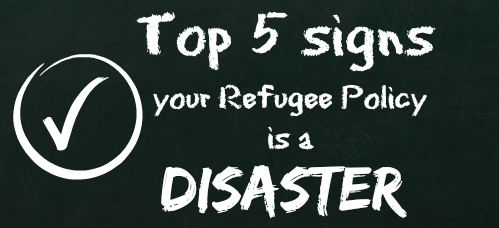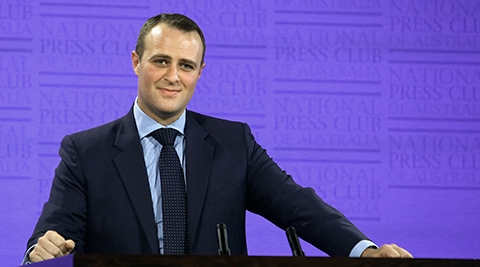The top 5 signs that your country’s Refugee Policy is a disaster

Australia’s Minister for Saying-We’ve-Stopped-the-Boats – one Mr Peter ‘PDuddy’ Dutton – was out and about this morning defending what he and his government believe is the best and most successful immigration policy EVER.
I decided to check out PDuddy’s claim against the following officialesque list …
The Top 5 signs your Refugee Policy is a disaster
Number Five: Refugees would rather return to possible death in a war-zone
than stay in the Refugee Centres your country provides
The Australian government has worked hard to convince as many refugees as it can to return to their home countries, despite the considerable potential risk to those refugees that doing so entails.
One Syrian refugee – Eyad – elected to return to probable death in Syria a few months ago, saying he would prefer to die with his family in Syria rather than stay on Manus island. On arriving in Syria he was arrested and tortured for 20 days. Following his release, he was allowed to return to his former home village where he was subsequently hit by shrapnel and saw his father die before him.
Number Four: You put refugees in the care of a government that has made
money from selling passports to terrorists & money-laundering
The way that Peter Dutton pontificates about ‘smashing’ the business of people-smugglers, you’d think he’d donned a cape and mask and turned into a one-man regional crime-fighting machine.
What PDuddy conveniently forgets to mention, when boasting of his crime-fighting achievements, is that the Australian government is propping up the Nauru government with our Refugee policy – and that the Nauru government is so beleaguered by corruption claims that the New Zealand government recently cut off aid to them. PDuddy also leaves out the fact that this same government was previously heavily sanctioned by the international community for selling Nauruan passports to terrorists and laundering money for the Russian Mafia.
Number Three: Your Refugee Centres make it onto the UNHRC’s torture list
In March this year, the UN Human Rights Commission released its report on torture, naming Australia as a country who had breached the UN Convention against Torture in our Refugee camps.
Of course, our government raced to immediately set up a Royal Commission to investigate the issues raised by the UN. Oh wait – no, that was a Royal Commission into the unions. What our government actually did in response to the UN report was to say that it was sick of being lectured.
Number Two: You are spending more on your Refugee Policy than the
combined GDP of 9 small countries
In 2015, the Australian government spent at least 4 billion on its Refugee Policy – of which 3 billion was to look after offshore refugees (including just under 1600 refugees on Nauru and Manus Island).
This is the equivalent of the combined GDP in 2014 for Tonga, Micronesia, Palau, the Marshall Islands, Kiribati, Tuvalu, Sao Tome and Principe, Dominica and Comoros.
By way of contrast, the UN has a budget of $157 million USD for 2015 to look after over 200,000 refugees in South-East Asia.
Number One: A country in the Axis-of-Evil thinks you’ve gone too far
Over 110 countries lined up at the UN this week to comment on Australia’s refugee policies. In fact, so many countries wanted to raise issues at the periodic UN review, that each was given a time limit of just over a minute to speak. Between them they still managed to raise over 300 concerns in just that space of time.
Among their number was long-term member of Bush’s ‘Axis-of-evil’ – North Korea – who said that they:
“… have serious concerns at the continued reports of … violence against refugees and asylum seekers”.
It’s official – Australia’s refugee policy is a disaster …
In all seriousness – our refugee policy really IS a disaster. It is pure propaganda – truthiness at its finest – to suggest otherwise.
And still Peter Dutton keeps a straight face while he claims that Australia’s Refugee policy:
- has saved lives – this is doubtful at best;
- has stopped people smugglers – if this were true, who exactly are they paying to turn around?
- to be the most generous in the world – this is actually an insult to countries like Turkey, Lebanon and Jordan who lay true claim to this title. We are literally nowhere near.
- to have protected our borders – from who exactly? From victims of war, terrorism, torture and persecution, who, if they had the funds to arrive here by plane would be allowed to stay? When did we start needing protection from victims? The reality is that these are the world’s most vulnerable people being used as political pawns. They aren’t terrorists. Or economic migrants. They are people with no safe place to call home.
It doesn’t matter what measure you pick …
- financial
- humanitarian
- doing our bit globally
- stopping crime in the region
- making our country more secure, or
- just plain common decency.
… there is not a single measure that doesn’t point at our government’s Refugee Policy as being at best an abject failure, and at worst a complete disaster that will haunt us in years to come.
This article was first published on ProgressiveConversation.
Like what we do at The AIMN?
You’ll like it even more knowing that your donation will help us to keep up the good fight.
Chuck in a few bucks and see just how far it goes!
Your contribution to help with the running costs of this site will be gratefully accepted.
You can donate through PayPal or credit card via the button below, or donate via bank transfer: BSB: 062500; A/c no: 10495969













